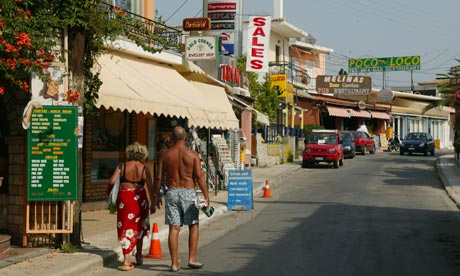
The number of Britons taking foreign holidays plunged last year as the 40-year trend towards regular overseas breaks fell at the fastest rate on record.
The recession prompted families to holiday at home and also saw a drop in business travel.
UK residents made 58.6m visits overseas in 2009 – 15% fewer than in 2008, the Office for National Statistics (ONS) said in its 2009 survey of travel trends.
The figures come from the ongoing international passenger survey, involving interviews with 300,000 travellers to and from Britain.
Last year's steep decline, representing 10.4m overseas visits, effectively reverses a four-decade trend of increasing foreign travel triggered by the rise of "cheap and cheerful" package holiday in the 1970s and the more recent lure of exotic, far-flung destinations.
Trips to the UK by overseas visitors also fell in 2009, dipping by 6.3% from 31.9m in 2008 to 29.9m.
The ONS said the falls followed a long period of overall growth in visits to and from the UK. Visits abroad had grown at an average of 4% per year for 25 years, and visits to the UK grew at an annual rate of 3.2%.
Overall, business travel was the biggest casualty of last year, with trips falling by 23% among UK residents going abroad and 19% among overseas residents coming to the UK.
While overseas visitors spent more, on average, on their trips to the UK than in previous years, UK residents cut their overseas spending. The net result was a £5.4bn reduction in the travel-related deficit to the UK.
Last year, very few overseas countries saw an increase in visits by UK residents. Egypt, Jamaica and Lithuania were exceptions, continuing an overall trend of rises in numbers of British tourists to these countries in recent years.
But the numbers of visits to these countries are dwarfed by those to both the UK's nearer neighbours in Europe and the US. Spain and France together accounted for 21.3m of the 58.6m visits abroad in 2009.
The swine flu alert discouraged travel to Mexico, which saw the sharpest drop – 49% – in visits from Britons.
Roger Smith, the survey manager of the International Passenger Survey, said the decline in foreign holidays taken by Britons was "striking", adding that "the long term trend has been very much of an increase in travel".
Looking at more recent trends, provisional figures for the first quarter of 2010 reveal that visits to the UK are bottoming out (falling by just 1% year on year), while the downturn in Britons' foreign holidays is continuing – falling by a further 9%.
A spokeswoman for the Association of British Travel Agents (Abta) said: "The downturn [in foreign holidays being taken by Britons] can be attributed to the recession of last year, while the value of the euro also had an negative impact.
"This year we are seeing the euro decreasing in value, which should have a more positive effect."
Patricia Yates, the strategy and communications director at the national tourism body VisitBritain, added: "Last year was very tough, dominated by the global economic difficulties.
"There are some glimmers of hope in that holiday visits increased slightly in 2009 while business tourism continued to see sharp declines.
"The North American market showed signs of improvement towards the end of the year, but the volcano ash cloud in April knocked that back."
She aaded that "our neighbours in Europe realised that the exchange rate with the pound had become so favourable that they could afford to spend more here".
As a result, the total amount spent by foreign tourists was £16.6bn – up 1.6% before inflation on 2008 is taken into account.
A record 3.8m visitors came to Britain from France, meaning one in eight of the 30m overseas visitors to the UK was French.

